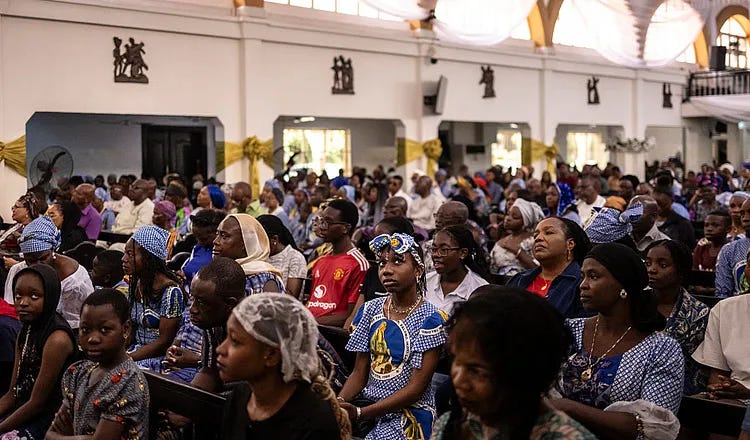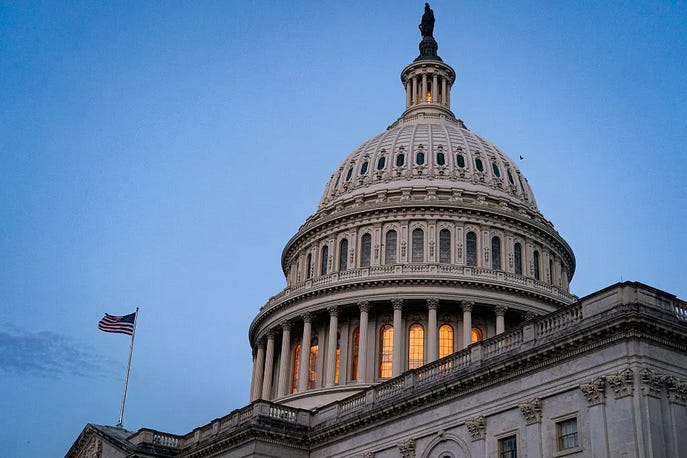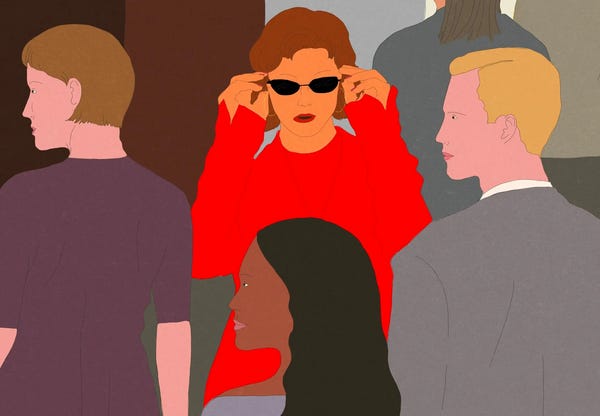As Christians Are Slaughtered, the World Looks Away | Most Americans Say Democracy Is Threatened as Political Violence Rises | What Makes Someone "Cool"?
On Unseen Suffering, Fragile Freedoms, and the Meaning of "Cool"
Dear Reader,
Happy Independence Day!
Before you fire up the grill or light the sparklers, I invite you to pause and reflect on the freedoms we celebrate today—as well as the responsibilities that come with them. In this edition, we look at the ignored suffering of persecuted Christians, the fragile state of democracy at home, and what it means to be “cool.”
Sources and links:
The Free Press: “As Christians Are Slaughtered, the World Looks Away”
Time.com: “Most Americans Say Democracy Is Threatened as Political Violence Rises”
The New York Times: “What Makes Someone Cool?”
Thanks for reading, for thinking deeply, and for caring about things that matter.
Craig
PS: I’d love to hear what you’re pondering as you read—especially before the fireworks begin. Leave a comment and/or let me know in the poll below which piece resonated most with you.
#1: As Christians Are Slaughtered, the World Looks Away

Anyone see or read about this in news outlets? Me, neither.
Published in The Free Press, the article is brutal in its description of the most recent slaughter of 218 Nigerian Christians last month. Victims were burned or hacked to death by machete, but you likely didn’t hear a mention from your favorite mainstream news source.
“On Friday June 13, over 500 Christians—many of them women and children—gathered together in temporary shelters in the town’s Market Square. Most of them had fled their homes across the region, hoping to find greater protection in Yelwata from a spate of recent attacks in which Islamist terrorists have massacred Christians.”
The post went on to describe the scale of the persecution of Nigerian Christians:
“Since 2009, Islamists in northern Nigeria have destroyed over 18,000 churches and, throughout the country, have murdered over 50,000 Christians. A further 5 million Christians have been displaced within the country, according to a 2023 Vatican report…
I recognize that news coverage decisions involve multiple factors (proximity, geopolitical significance, access for journalists, etc.), but how is this story not everywhere? I thought “if it bleeds, it leads” was a holy mantra of mainstream news. Maybe what determines the headlines is whose blood it is.
“As Western governments have turned away from the issue, so too has the mainstream media. ‘If 10 people are killed in Ukraine, it becomes a major headline across all the newspapers across the world. If 100 people are killed in Gaza, it becomes the major news item on CNN, BBC, Al Jazeera and company,’ said [Nigerian journalist Steven] Kefas. By contrast, several of the Islamist attacks in Nigeria have never been reported by the mainstream media in the West; it has been left to the small Christian press to cover the story.”
One such “small Christian press” is Terry Mattingly,1 a 30+ year veteran religion-beat scribe in the mainstream press whose GetReligion.org side project focused for 20 years on how secular media don’t “get” religion. He also writes a Substack newsletter titled Rational Sheep, where he recently commented:
“Week after week, this topic keeps showing up in my email inbox—the slaughter of Catholics and Protestants in Nigeria. This has been going on for decades (click here for U.S. State Department reports)…Why aren’t the waves of persecution in Nigeria covered by elite newsrooms? That’s the question that I hear over and over, year after year.
When innocents and combatants die in Gaza, major print and television newsrooms respond—as they should—with strong coverage. This has not been the case in Nigeria, even though the violence there has been staggering. For years, this was prime material for GetReligion.org, which focused on why so many newsrooms struggle to cover how religion affects real news, affecting real people, in the real world. That website’s massive archive remains online, open to readers and researchers.”
Now that you know, don’t look away. Here are four practical things you can do:
Pray for the Church in Nigeria: for courage, comfort, and faithfulness under persecution.
Stay informed through Christian outlets that cover these stories, like Rational Sheep and International Christian Concern.
Support trusted ministries such as Voice of the Martyrs and Open Doors, which provide aid to Nigerian Christians.
Contact your representatives urging the U.S. State Department to continue monitoring and addressing religious persecution in Nigeria.
Psalm 116:15 says, “Precious in the sight of the Lord is the death of his saints.”
Their blood should matter to us, too.
#2: Most Americans Say Democracy Is Threatened as Political Violence Rises
As we celebrate Independence Day this July 4, it’s worth asking what we’re actually celebrating, if it’s good, and if so, what it will take to keep it.
According to Time, the state of our democracy feels fragile to many Americans:
“Around three-quarters of Americans feel that U.S. divisiveness poses a ‘serious threat to democracy,’ according to the NPR/PBS News/Marist poll released on Tuesday. The survey, conducted from June 23 to 25 in the wake of U.S. airstrikes on Iran and the shootings of two Minnesota lawmakers and their spouses, found that 89% of Democrats, 80% of independents, and 57% of Republicans believe the future of democracy is threatened.”
As the poll noted, 73% of Americans now consider political violence a major concern. Immigration tensions and low confidence in leaders also contribute to the sense that our freedoms are under strain. But none of these are just political problems; they’re spiritual ones. Founding Father John Adams famously said,
“Our Constitution was made only for a moral and religious People. It is wholly inadequate to the government of any other.”
Freedom without virtue drifts toward chaos and conflict; independence without covenant drifts toward isolation and suspicion. We live in a culture obsessed with individual rights, but the freedom we celebrate was always meant to enable responsibility—to God, to neighbor, to ourselves.
Laws alone can’t preserve freedom; only a people willing and working to restrain themselves, pursue justice, and seek peace are the ones who can. But “willing and working to restrain ourselves” does not a catchy campaign slogan make.
As we celebrate Independence Day, how are we using our freedom? Are we living as peacemakers, truth-tellers, and servants? Or are we only guarding our personal independence, sewing discord and causing division in the process?
True freedom is not about doing whatever we want, but about being free to more and more love God and neighbor. Perhaps then, our democracy will not just survive, but our freedom will become something truly worth celebrating.
Happy Independence Day.
#3: What Makes Someone Cool?
I’m old enough (finally) to not be as preoccupied about being “cool” as I was in high school and college. However, as a recovering people-pleaser, the temptation is always there, which is why this article in The New York Times caught my eye.
“Is there a secret sauce that helps explain why people as different as David Bowie, Samuel L. Jackson and Charli XCX all seem so self-assured and, well, cool?
A new study suggests that there are six specific traits that these people tend to have in common: Cool people are largely perceived to be extroverted, hedonistic, powerful, adventurous, open, and autonomous.”
Hmmm. No, no, no, sometimes (sort of), usually (but not always), as much as possible. All of a sudden, my coolness factor (or lack thereof) makes sense (and here I thought I was just old).
But what does “cool” even mean? And does it transcend cultures?
“The study, which was published on Monday in the Journal of Experimental Psychology: General, surveyed nearly 6,000 participants from 12 countries around the world. Their beliefs about what’s ‘cool’ were similar regardless of where the study participants lived, and despite differences in age, income level, education or gender.”
Seriously? “Coolness” as a characteristic can’t just be the American/Western version exported via music and movies, can it? Please let there be other versions.
“In the study, each participant had to recognize the word ‘cool’ in English, without translation, suggesting that they were already familiar with—or maybe even idolized—notions of coolness from wealthy Western countries like the United States.
In that sense, the study offers a window into the spread of cultural beliefs from one group of people to another, said Joseph Henrich, an anthropologist and a professor of human evolutionary biology at Harvard who was not involved in the study.”
That’s more plausible, but it still doesn’t answer my question. Are there other versions of what other cultures define as their own brand of “cool”?
“Other studies have shown that there are important cultural differences that can affect the traits that we value.
‘Factors like aggression make us have higher status in some Western cultures and simultaneously give us less status in the East,’ said Mitch Prinstein, the chief of psychology at the American Psychological Association, who has written two books about popularity, which can be a consequence of coolness.
Okay, so there is some differentiation. That’s…cool. What about different ages?
“Research on coolness suggests that the desire to be cool is particularly strong during adolescence, and it influences not only what people buy or whom they admire but also how they talk and what they do for fun.”
Okay, nothing new there. One of the more interesting aspects of the study, however, is its inquiry into the difference between being “cool” and being “good.”
“While the cool and good people had overlapping traits, compared with their cool counterparts, good people were perceived as more conforming, traditional, secure, warm, agreeable, universalistic (the extent to which a person sees everyone and everything as being equal or equally worthy of care and respect), conscientious and calm. Those who were perceived as capable were equally considered cool and good.”
So capable equals cool and good. Does that mean coolness is a character trait I need to pursue again? In answer to that question, Dr. Caleb Warren, one of the authors of the study and a professor at the Eller College of Management at the University of Arizona, said, “I have serious doubts.”
“Coolness that involves risk-taking and being socially precocious during adolescence may offer popularity during youth, but one study published in 2014 found that many teenagers who behaved in this way would later struggle in their 20s, developing problems with alcohol, drugs and relationships. ‘They are doing more extreme things to try to act cool,’ one of the researchers told The New York Times.”
No thanks. I’m good. Turns out the best kind of “cool” may simply be growing into the kind of person who doesn’t need to be cool at all.
“Freedom is not the right to do as we please, but the opportunity to do what is right.”
—Peter Marshall
I was a lowly third-year high school Bible and Christian Ethics teacher when Mattingly interviewed me for this article at On Religion in September 2009. Good times.







Of all the various sects and groups, Christians seem to be one of the few who can be mocked, vilified, oppressed, and murdered with minimal global outcry, especially among the elites in the West. Just one of the countless prophecies He fulfilled.
. . .
Every time I see these kinds of divisiveness polls, I am taken back to the many dark chapters of American history that manifested in not just violent rhetoric, but violent acts. We often forget (if we ever knew) that our initial Revolutionary struggle was just as much a "civil war" as what came a century later. Despite the lovely painted perceptions of our Founding Fathers, the early idea of "merica" was no more a consensus than the tenuous plurality we know now.
But your point is salient... it's absurd to expect unredeemed people indifferent to virtue or piety to act any other way. Heck, it's often a challenge to get "saved" people to act like Christians. Present company included!
. . .
"The only true currency in this bankrupt world is what you share with someone else when you're uncool." (Lester Bangs, as quoted in Almost Famous)
I flatter myself to be cooler than the other side of the pillow, but I'd much rather be thought of as kind and compassionate than cool. My experience with the general consensus of "cool" is that it is typically marked with a sort of passive-aggressive apathy. I've often chosen the less cool path of being authentic, sincere, and perhaps a bit "try hard" rather than "cool." Which, according to my "Gen Alpha" younger offspring, makes me somewhat "cringe."
So like a wise philosopher once said: "If peeing your pants is cool, consider me Miles Davis."
Story 3. You can have the most fun with this one. So the Stoics were cool in ancient Greece? The flagallents (sp?) In late antiquity? One fatal flaw in the underlying study is that they asked Canadians what is cool. Canadians?